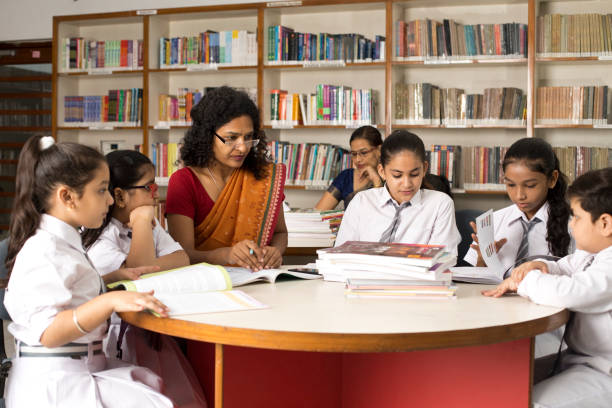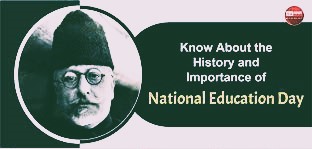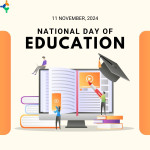National Education Day
In India, November 11th is recognised annually as National Education Day in honour of Maulana Abul Kalam Azad's birthdate. Azad served as the first education minister of independent India and made a substantial contribution to the establishment of the country's educational framework. In 2008, November 11th was declared 'National Education Day' by the Ministry of Human Resource Development in recognition of his contributions. When it comes to influencing the Indian educational system, Azad was a pioneer. During his administration, the Secondary School Board, AICTE, and UGC were founded. To learn more about National Education Day, Azad, and its history, read the information below.

The Past
The Ministry of Human Resource Development (HRD) declared on September 11, 2008, that 11 November would be National Education Day, a day set aside to honour the great man's birthday and remember his contributions to the area of education. Since 2008, National Education Day has been observed annually in India without being officially recognised as a holiday. Maulana Abul Kalam Azad believed that schools served as the nation's laboratory for creating its future citizens. He is the driving force behind India's other institutes as well as the IITs. Let's now examine Maulana Abul Kalam Azad's early life, family, and accomplishments in more depth.

Importance
The Indian Ministry of Education was headed by Maulana Abul Kamal Azad from August 15, 1947, to February 2, 1958. He was a prominent member of the Indian National Congress, an Islamic theologian, a writer, and a fighter for Indian independence. Maulana Abul Kalam Azad was influential in creating India's educational system. He has always placed a strong emphasis on girls' education and free public education for all kids under the age of 14.

In addition to basic education, he promoted giving all children technical education and career training. With a great vision, he has always inspired people by raising awareness about education and working hard to build the education system to the highest possible standard. He wanted to see this country grow in terms of education and firmly believed that if a country has a strong enough education system, then there will be no poverty and illiteracy.
Maulana Azad Abul Kalam?
India's first minister of education, Maulana Abul Kalam Azad, held the position from August 15, 1947, until February 2, 1958. He founded some of the top educational institutions in the country during his administration. He also participated in the Indian independence movement. One of the most significant figures of the day, Azad had strong socialist and secularist beliefs. In 1989, the Maulana Azad Education Foundation was founded by the Ministry of Minority Affairs as a way to honour his legacy. India's highest civilian award, the Bharat Ratna, was given to him posthumously in 1992.

Maulana Abul Kalam Azad's Input into the Education Sector
During Azad's presidency, the following organisations were founded: the Secondary School Board, the University Board of Education, the Kharagpur Institute for Higher Education, the AICTE, and the UGC. He also contributed to the founding of universities like IIT Kharagpur and Jamia Millia Islamia. Numerous dignitaries honour and remember Azad's role in laying the groundwork for India's robust educational system. The Sahitya Academy, Lalit Kala Academy, Sangeet Natak Academy, Indian Council for Cultural Relations (ICCR), and Scientific and Council of Scientific and Industrial Research (CSIR) were all founded by Maulana Abul Kalam Azad.
Theme
Every year, National Education Day events are centred around a different subject. "Prioritising Education: Investing in Our People" is the topic for 2023. This subject emphasises how crucial it is to spend our attention and resources on improving education so that it continues to be relevant in our changing environment. Placing students at the centre of education and encouraging diversity and creativity are the ways to improve quality and equity. It's all about empowering people, fostering a better future for everybody, and coordinating education with the rapidly shifting global environment.
















